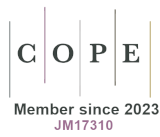Coronavirus-Pandemie im Zerrspiegel des polnischen Pressewitzes
DOI:
https://doi.org/10.18778/1427-9665.17.03Słowa kluczowe:
humour in pandemic, coronavirus pandemic as a joke theme, humour of the “Tygodniówka” in “Angora” magazineAbstrakt
The analysis of the “Tygodniówka” column published on the last page of a weekly magazine “Angora” for the years 2020–2021 made it possible to evaluate the way of presenting an individual and his everyday life during the COVID-19 pandemic in a crooked mirror of cartoon jokes. During one year there is an evident change in attitudes and behaviour of people who have already got used to the pandemic to some extent. Due to the length of the material collected and the most visible change that took place in the way of presenting the mocked events, attitudes and human behaviour in the past year, two specific issues of “Angora” were selected, i.e. 49/2020 and 49/2021. In addition, the examples from the holiday issue 33/2021 have shown how the behaviour of an individual living in constant fear of the coronavirus changes during a vacation. A man tired of the prohibitions and sanitary regime to be in force also seeks opportunities not to follow them for a while. He consciously circumvents restrictions and prohibitions, does not comply with the sanitary regime, which is manifested by the resignation from wearing masks and maintaining social distance. All of this can be found in the jokes of “Tygodniówka”, where mercilessly accurately reflects the pandemic reality, although it’s been showed in the crooked mirror. The person seems to be sure that the coronavirus has magically ceased to be a threat, perhaps even disappeared.
Bibliografia
Bergson H. (2011), Das Lachen. Ein Essay über die Bedeutung des Komischen. Hamburg: Meiner.
Google Scholar
Freud S. (1974), Der Witz und seine Beziehung zum Unbewußten. Frankfurt a. M.: Fischer.
Google Scholar
Hodalska M. (2020), Internetowe żarty z pandemii koronawirusa w „zbiorowej pamięci zarazy“, „Kultura – Media – Teologia“, Nr. 41, S. 7–37.
Google Scholar
DOI: https://doi.org/10.21697/kmt.41.1
Hodalska M. (2020), Koronahumor jako forma komunikacji i „tarcza antydepresyjna“: polskie internetowe żarty wirusowe, https://ruj.uj.edu.pl/xmlui/bitstream/handle/item/252903/hodalska_korona-humor_jako_forma_komunikacji_2020.pdf?sequence=1&isAllowed=y Zugriff 11.12.2021.
Google Scholar
Humor jako niezawodna szczepionka na złe czasy, audycja radiowa, data emisji: 5.05.2020, https://www.polskieradio24.pl/130/5646/Artykul/2505118,Humor-jako-niezawodna-szczepionka-na-zle-czasy Zugriff 11.12.2021.
Google Scholar
Kapiszewski J. (2021), Dobry humor w walce z epidemią. Świat pokazuje, jak nie tracić ducha w czasach zarazy, https://www.gazetaprawna.pl/wiadomosci/artykuly/1460876,koronawirus-na-swiece-dobry-humor-w-walce-z-pandemia.html Zugriff 11.12.2021.
Google Scholar
Plessner H. (1988), Pytanie o conditio humana. Warszawa: Państwowy Instytut Wydawniczy.
Google Scholar
Rusek A. (2012), Wielowymiarowość humoru. In: Innowacje psychologiczne, 2012, Band 1, Nr. 1, S. 117–127, https://wydawnictwo.wsei.eu/wp-content/uploads/2020/09/IP_1_2012.pdf Zugriff: 10.11.2021.
Google Scholar
Sikorska-Bujnowicz K. (2011), Deutscher Pressewitz und seine gesellschaftskritische Funktion. In: W. Sadziński, (Hrsg.), Die Presse als sprach- und kulturwissenschaftliches Forschungsobjekt (Folia Germanica 7). Łódź: Piktor, S. 69–78.
Google Scholar
Sikorska-Bujnowicz K. (2013), Sprachliche Mittel des Humoristischen im Deutschen und im Polnischen. Łódź: Wydawnictwo Uniwersytetu Łódzkiego.
Google Scholar
DOI: https://doi.org/10.18778/7969-049-7
Sikorska-Bujnowicz K. (2016), Zum deutschen Ethnowitz. Eine korpusgestützte Analyse. Łódź: Wydawnictwo Biblioteka.
Google Scholar
Sikorska-Bujnowicz K. (2017), Motyw choroby w żartach, In: K. Szmigiero, D. Gonigroszek (Hrsg.), Zdrowie i choroba w badaniach humanistycznych i społecznych. Piotrków Trybunalski: Wydawnictwo Uniwersytetu Jana Kochanowskiego Filia w Piotrkowie Trybunalskim, S. 237–248.
Google Scholar
Sikorska-Bujnowicz K. (2019), Współczesny kabaret polski a tematy tabu. In: D. Utracka (Hrg.), Idee, wartości, słowa w życiu publicznym i sztuce. Łódź: Wydawnictwo Akademii Humanistyczno-Ekonomicznej w Łodzi, S. 85–99.
Google Scholar
https://sjp.pwn.pl/szukaj/le%C5%BCakowanie.html Zugriff 11.12.2021.
Google Scholar
https://sjp.pwn.pl/szukaj/tygodni%C3%B3wka.html Zugriff 11.12.2021.
Google Scholar
https://wsjp.pl/haslo/podglad/99522/pandemia/5241400/koronawirusa Zugriff 11.12.2021.
Google Scholar
https://www.angora.com.pl/ Zugriff 11.12.2021.
Google Scholar
https://www.angora.com.pl/kontakt.php Zugriff 11.12.2021.
Google Scholar
Pobrania
Opublikowane
Wersje
- 2023-12-31 - (2)
- 2023-12-31 - (1)
Jak cytować
Numer
Dział
Licencja

Utwór dostępny jest na licencji Creative Commons Uznanie autorstwa – Użycie niekomercyjne – Bez utworów zależnych 4.0 Międzynarodowe.










